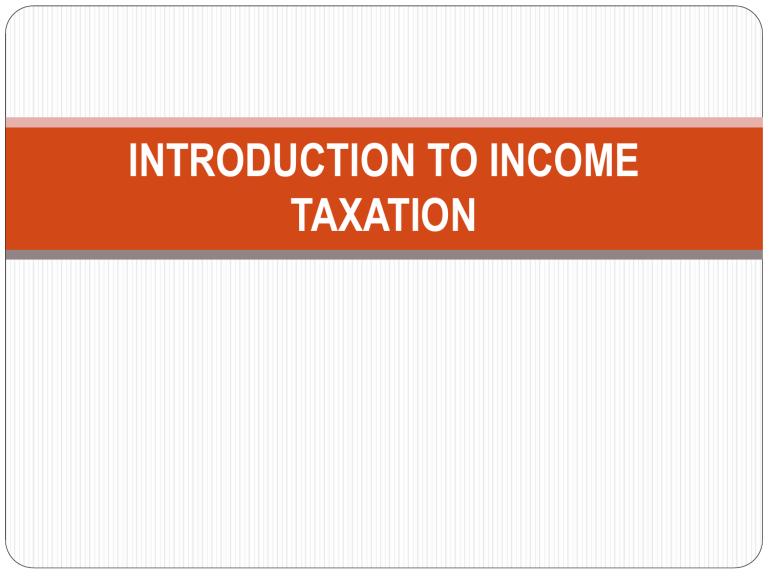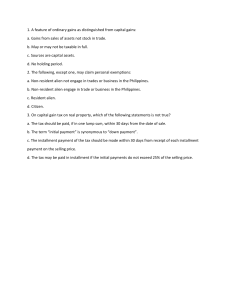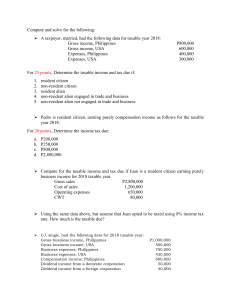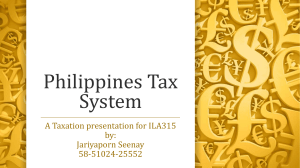
INTRODUCTION TO INCOME TAXATION PEREZ, EDZEL S. VIZCARRA, IMEE ANTONETTE PAPA, BERMALYN DA F. PADUNAN, MARJORIE D. BULACAN, GABRIEL G. ESCUDERO, MICAIRAH D. VISPO, JAMAICA MAE P. MARTY, EPHREEN GRACE R. ELEMEN, JOMELY P. TALPLACID O, JENINA NHELLE D. SONGCUAN, ALMIRA P. MANIQUIZ, MARY GRACE L. GONZALES, GINN ROSE J. ANGELES, MARIELLE ANN Q. ANCHETA, RONELYNN FRANZ V. Seat Plan – Income taxation ROSALES, DAN GABRIEL D. GALVEZ, MARY JANE A. NIEVO, LIMUEL F. Learning Objectives The concept of gross income 2. Types of income taxpayers 3. The general rules in income taxation 4. The income tax situs rules 1. Learning Objective 1 The concept of gross income Why is income subject to tax? What is income for taxation purposes? the tax concept of income is simply referred to as “gross income” gross income simply means taxable income (layman’s term) taxable income refer to certain items of gross income less deductions and personal exemptions allowable by law (NIRC) Item 1 2 3 4 5 6 7 8 9 10 11 12 13 14 15 16 17 18 19 20 21 Winnings from gambling Income from swindling Indemnity for moral damages Harvested fruits from an orchard Compensation Income Interest Income Amount received by an insured in excess of insurance premium paid Proceeds of life insurance received by the heirs of the insured Gain on sale of goods by the home office to its branch Gain on sale of goods and services between relatives Gain on sale of goods by a parent corporation to a subsidiaru corporation Appreciation in the value of land Birth of animal offspring Income of a registed Barangay MicroBusiness Enterprise Cancellation of debt out of gratuity of the creditor Matured interest from a coupon bonds Receipt of bank loan Salaries of a minimum wage earner PCSO or lotto winnings Benefits from GSIS, SSS, Pag-Ibig or Philhealth Discovery of hidden treasure TAXABLE EXEMPT Elements of gross income It is a return on capital that increases net worth It is a realized benefit It is not exempted by law, contract or treaty Elements of gross income It is a return on capital that increases net worth Elements of gross income Capital deemed with infinite value (return of capital) 1. 2. 3. Life Health Human Reputations Elements of gross income Life Under NIRC, the proceeds of life insurance policies paid to the heirs or beneficiaries upon death of the insured, whether in single sum or otherwise, are exempt from income tax. But the following are taxable return on capital from insurance policies. 1. Any excess amount, received over premiums paid by the insured upon surrender or maturity of the policy. 2. Gain realized by the insured from the assignment or sale of his insurance policy. 3. Any excess of the proceeds received over the acquisition costs and premium payments by an assignee of a life insurance policy. Recovery of lost capital vs. Recovery of lost profits Return of capital NOT TAXABLE Return on capital TAXABLE 1. Recovery of lost profits through insurance, indemnity contracts or legal suits. 2. Proceeds of crop or livestock insurance 3. Guarantee payments 4. Indemnity received from patent infringement suit Return of capital and return on capital Consideration 1 2 3 4 5 1,000,000.00 500,000.00 300,000.00 600,000.00 1,200,000.00 For the loss of Health 40,000 car 350,000 building Income Life Return of Capital Return on Capital Consideration 1 2 3 4 5 1,000,000.00 500,000.00 300,000.00 600,000.00 1,200,000.00 For the loss of Return of Capital Return on Capital Health 40,000 car 350,000 building Income Life 1,000,000.00 400,000.00 300,000.00 1,200,000.00 100,000.00 600,000.00 - Elements of gross income It is a realized benefit BENEFIT CONCEPT – the term benefit means any form of advantage derived by the taxpayer - increase in the networth of the taxpayer (income,donation of inheritance) Not benefits (not taxable) 1. Receipt of Loan 2. Discovery of lost properties 3. Receipt of money or property to be held in trust, to be remitted to other person REALIZED CONCEPT - “realized” means earned, meaning, there is a degree of undertaking or sacrifice from the taxpayer to be entitled of the benefit Requisites: 1. There must be an exhange transaction 2. The transaction involves another entity 3. It increases the net worth of the recipient. Exchange transactions BILATERAL TRANSFER UNILATERAL TRANSFER SALE SUCCESSION BARTER DONATION - These are referred to as - Also referred to as”gratuitous “onerous transaction” - Subject to income tax - Called “exchanges” transactions” - Subject to transfer tax - Referred to as “transfers” Complex transactions - partly gratuitous and partly onerous - transfer for less than full and adequate consideration - Subject to income and transfer tax Income tax and transfer tax TRANSACTIONS 1 2 3 4 5 6 Barter of properties Sale of Goods Rendering of Services Donation of Properties Transfer of properties from a decedent to the heirs upon death Transfer for less than full and adequate consideration INCOME TAX TRANSFER TAX 1 2 3 4 5 6 TRANSACTIONS INCOME TAX Barter of properties Sale of Goods Rendering of Services Donation of Properties Transfer of properties from a decedent to the heirs upon death Transfer for less than full and adequate consideration X X X TRANSFER TAX X X X X Another entity Natural (living persons) Juridical (created by law) Notes: The sales of a home office to its branch office are not taxable because they pertain to one and the same entity The income between businesses of a proprietor should not be taxed since proprietorship businesses are taxable upon the same owner. Benefits in the absence of transfers – Not taxable They are referred to as unrealized gains or holding gains because they have not yet materialized in an exchange transactions. 1. Increase in value of investments in equity or debt securities 2. Increase in value of real properties held 3. Increase in value of foreign currencies held or receivable 4. Decrease in value of foreign currency denominated debt by virtue of favorable fluctuation in exchange rates 5. Increase in value of land due to the discovery of mineral reserves Elements of gross income It is not exempted by law, contract or treaty The following are the items of income exempted by law from taxation, hence, not considered items of gross income. 1. Income of qualified employee trust fund 2. Revenue of non-profit non-stock educational institution 3. SSS,GSIS, Pag-IBIG or Philhealth benefits’ 4. Salaries and wages of minimum wage earners and qualified senior citizen 5. Regular Income of Micro-business Enterprises (BMEs) 6. Income of foreign governments and foreign governmentowned and controlled corporations 7. Income of international missions and organizations with income tax immunity Item 1 2 3 4 5 6 7 8 9 10 11 12 13 14 15 16 17 17 18 19 20 21 Winnings from gambling Income from swindling Indemnity for moral damages Harvested fruits from an orchard Compensation Income Interest Income Amount received by an insured in excess of insurance premium paid Proceeds of life insurance received by the heirs of the insured Gain on sale of goods by the home office to its branch Gain on sale of goods and services between relatives Gain on sale of goods by a parent corporation to a subsidiaru corporation Appreciation in the value of land Birth of animal offspring Income of a registed Barangay MicroBusiness Enterprise Cancellation of debt out of gratuity of the creditor Cancellation of debt by the creditor in exhange of services rendered by the debtor Matured interest from a coupon bonds Receipt of bank loan Salaries of a minimum wage earner PCSO or lotto winnings Benefits from GSIS, SSS, Pag-Ibig or Philhealth Discovery of hidden treasure 1 2 3 4 5 6 7 8 9 10 11 12 13 14 15 16 17 17 18 19 20 21 Item TAXABLE Winnings from gambling Income from swindling Indemnity for moral damages Harvested fruits from an orchard Compensation Income Interest Income Amount received by an insured in excess of insurance premium paid Proceeds of life insurance received by the heirs of the insured Gain on sale of goods by the home office to its branch Gain on sale of goods and services between relatives Gain on sale of goods by a parent corporation to a subsidiaru corporation Appreciation in the value of land Birth of animal offspring Income of a registed Barangay MicroBusiness Enterprise Cancellation of debt out of gratuity of the creditor Cancellation of debt by the creditor in exhange of services rendered by the debtor Matured interest from a coupon bonds Receipt of bank loan Salaries of a minimum wage earner PCSO or lotto winnings Benefits from GSIS, SSS, Pag-Ibig or Philhealth Discovery of hidden treasure x x EXEMPT x x x x x x x x x x x x x x x x x x x x Types of income taxpayers A. Individuals 1. Citizen a. Resident Citizen b. Non-resident Citizen 2. Alien a. Resident Alien b. Non-resident alien a. Engaged in trade or business b. Not engaged in trade or business 3. Taxable estates and trusts B. Corporations 1. Domestic corporation 2. Foreign Corporation a. Resident foreign corporation b. Non-resident foreign corporation INDIVIDUAL INCOME TAXPAYERS Citizens (under Constitution) a. Those who are citizens of the Philippines at the time of adoption of the Constitution on February 2, 1987. b. Those who are fathers and mothers are citizens of the Philippines c. Those born before January 17, 1973 of Filipino mothers who elected Filipino Citizenzhip upon reaching the age of majority d. Those who are naturalized in accordance with law Classification of citizens: A. RESIDENT CITIZEN – A Filipino Citizen residing in the Philippines A. NON-RESIDENT CITIZEN includes a citizen 1. With a definite intention to reside abroad. 2. Who leaves the Philippines during the taxable year to reside abroad, either as an immigrant or for an employment on a permanent basis 3. Who works and derives income from abroad and whose employment thereat requires him to be physically present abroad most of the time during the taxable year. 4. Who has been previously considered as non-resident citizen and who arrives in the Philippines at anytime during the taxable year to reside permanently in the Philippines shall likewise be treated as non-resident citizen for the taxable year in which he arrives in the Philippines with respect to his income derived from sources abroad until the date of his arrival in the Philippines. NOTE: Filipino Working in Philippine embassies or Philippine consulate offficer are not considered non-resident citizens. Alien A. RESIDENT ALIEN – an individual who is residing in the Philippines but is not citizen thereof,such as: 1. An alien who lives in the Philippines without definite intention as to his stay. 2. One who comes to the Philippines for a definite purpose which in its nature would require an extended stay and to that end makes his home temporarily in the Philippines, although it may be his intention at all times to return his domicile abroad; B. NON-RESIDENT ALIEN –individuals who is not residing in the Philippines and who is not a citizen therof 1. Non-resident aliens engaged in business (NRA-ETB) – aliens who stayed in the Philippines for an aggregate period of more than 180 days during the year 2. Non-resident aliens not engaged in business (NRA-NETB) a. Aliens who come to the Philippines for a definite purpose which in its nature may be promptly accomplished. b. Aliens who shall come to the Philippines and stay therein for an aggregate period of not more than 180 days during the year. THE GENERAL CLASSIFICATION RULE FOR INDIVIDUALS Intention 1. 1. 2. 3. 4. An alien is normally non-resident. An alien who come to the Philippines with a tourist visa would still be classified as nonresident alien. A citizen is normally resident. A citizen who would go abroad under a tourist visa would still be considered a resident citizen. An alien who come to the Philippine with an immigration visa would be reclassified as a resident alien upon his arrival. A citizen who would go abroad with a two-year working visa would be reclassified as a non-resident citizen upon his departure. THE GENERAL CLASSIFICATION RULE FOR INDIVIDUALS Length of Stay 2. 1. 2. 3. 4. Citizens staying abroad for a period of at least 183 days are considered non-resident citizen. Aliens who stayed in the Philippines for more than 1 year as of the end of the taxable year are considered resident alien. Aliens who are staying in the Philippines for not more than 1 year but more than 180 days are deemed non-resident aliens engaged in business. Aliens who stayed in the Philippines for not more than 180 days are considered non-resident alien not engaged in trade or business. Taxable Estates and Trusts 1. ESTATE – refers to the properties, rigths and obligations of a deceased person not extinguished by his death. Estates under judicial settlement are treated as individual taxpayer. The estate is taxable on the income of the properties left by the decedent. Estates under extrajudicial settlement are exempt entities. The income of the properties of the estate under extrajudicial settlement is taxble to the heirs. 2. TRUST – a trust is an arrangement whereby one person (grantor or trustor) transfers (i.e.donates) property to another person (beneficiary), which will be held under the management of a third party (trustee or fiduciary). Irrevocable trusts - treated in taxation as if it is an individual taxpayer - The income of the property held in trust is taxable to the trust Revocable trusts - not taxable entities and are not considered as individual taxpayer - The income of the property held in trust is taxable to the grantor not to the trust Corporate Income Taxpayers Corporation – include partnerships, no matter how created or organized, joint stock companies, joint accounts, association, or insurance companies, EXCEPT 1. general professional partnerships 2. joint venture or consortium formed for the purpose of undertaking construction projects or engaging in petroleum, coal, geothermal and other energy operations pursuant to an operating consortium agreement under a service contract with the Government. DOMESTIC CORPORATION – corporation organized in accordance with Philippine laws. FOREIGN CORPORATION-organized in a foreign law. TYPES: 1. Resident foreign corporation (RFC)- a foreign corporation which operates and conducts business in the Philippines through a permanent establishment 2. Non-resident foreign corporation (NRFC) –a foreign corporation which does not operate or conduct business in the Philippines. SPECIAL CORPORATION- special corporations are domestic or foreign corporations which are subject to special tax rules or preferential tax rates. OTHER CORPORATE TAXPAYERS 1. PARTNERSHIP Types of Partnership a. General professional partnership (GPP) b. Business partnership 2. JOINT VENTURE – is a business undertaking for a particular purpose. It may be organized as a partnership or a corporation. Types of Joint Venture a. Exempt joint ventures – formed for the purpose of undetaking construction projects or petroleum, coal, geothermal and other energy operations, pursuant to an operating consortium agreement under a service contract with the Government b. Taxable joint ventures 3. CO-OWNERSHIP – is joint ownership of a property formed for the purpose of preserving the same and/or dividing its income. Note: A co-ownership that is limited to property preservation or income collection is not a taxable entity and is exempt but the co-owners are taxable to their share on the income of the co-owned property. A co-ownership that reinvests the income of the co-owned property to other income producing properties or ventures will be considered an unregistered partnership as a corporation. DC, RFC, NRFC, NRA-ETB, NRA-NETB, NT, RC, NRC, RA PERSON OR ENTITY 1 2 3 4 5 6 7 8 9 10 11 12 13 14 15 16 17 18 A fat Mexican tourist A hardworking overseas Filipino worker An expatriate employee A Filipino who is privately employed in the Philippines An unemployed Filipino residing in the Philippines A Chinese businessman who has his domicile in the Philippines for 6 months A Japanese who married a beautiful Filipina and has been residing in the Philippines for 2 years A 2nd year Korean College student studying in the Philippines A corporation incorporated under Philippine law A foreign corporation doing business in the Philippines T rust designated by the donor as irrevocable T rust designated by the donor as revocable A business partnership A joint venture organized under a foreign law and is not operating in the Philippines An estate of a Filipino citizen judicially administered in Japan An estate of a Filipino citizen extra-judicially administered in the Philippines A taxable joint venture organized in the Philippines A non-profit corporation organized in the Philippines CLASSIFICATION THE GENERAL RULES IN INCOME TAXATION Residency & Citizenship Rule THE GENERAL RULES IN INCOME TAXATION Residency & Citizenship Rule General Income Tax Rule TAXPAYER 1 2 3 4 5 6 7 8 Non-resident citizen Resident alien Non-resident alien engaged in trade or business Resident foreign corporation Resident Citizen Non-resident alien not engaged in business Non-resident foreign corporation Domestic Corporation Taxable trusts established by a Filipino citizen in the 9 Philippines Taxable estate of a non-resident citizen judicially 10 administered abroad WORLD INCOME PHILIPPINE INCOME SITUS OF INCOME VS. SOURCE Place of taxation/jurisdiction OF INCOME Activity or Property INCOME SITUS RULES Types of Income Place of taxation (situs) 1. Interest Income Debtor's Residence 2. Royalties Where the intangible is employed 3. Rent Income Location of the property 4. Service Income Place where the service is rendered Other Income Situs Rules A. GAIN ON SALE OF PROPERTIES Personal Property Domestic Securities- presumed earned within Philippines Other Personal Properties- earned in the place where the property is sold Real Property – earned where the property is located B. DIVIDEND INCOME 1. Domestic Corporation – presumed earned within 2. Foreign Corporation a. Resident Foreign Corporation - depends on the predominance test The Pre-Dominance test If the ratio of the Philippine gross income over the world gross income of the resident foreign corporation in the three-year period preceding the year of dividend declaration is - at least 50%, the portion of the dividend corresponding to the Philippine gross income ratio is earned within - Less than 50%, the entire dividend received is earned abroad b. Non-resident foreign corporation – earned abroad Example: In 2014, Sarah received a P400,000 dividend income from ABC Corporation . ABC Corporation had the following gross income in 2016 through 2018. 2016 2017 2018 Philippines 100,000 200,000 300,000 600,000 Abroad 200,000 100,000 100,000 400,000 TOTAL TOTAL 1,000,000 If ABC Corporation is a resident foreign corporation. Earned within (60% x 400,000) 240,000 Earned without (40% x 400,000) 160,000 C. MERCHANDISING INCOME - earned where the property is sold D. MANUFACTURING INCOME – earned where the goods are manufactured and sold Income Description Rey earned P100,000 interest income; 40% of these were 1 from non-resident debtors. A finance company earned P1,000,000 royalties from a 2 franchise, 40% of these were derived abroad. Raymond earned P100,000 rent from OFWs from his apartment in the US. He also earned P40,000 rent from his 3 Philippine condominium unit. Chester, a resident citizen, works home online and submits his output to clients. He collected P100,000 service fee from 4 foreign clients and P20,000 from resident clients. Mark rendered audit services to client in Afghanistan for 5 P500,000. The services were paid in Afghanistan. Within Without Income Description Jun has a store in a tourist park in baguio City, Philippines. He earned a total of P40,000 gain from selling souvenir 6 items, 40% were from foreign tourists. Don Maraino asold at a gain of P2,000,000 to a client abroad a commercial builsing located in Quezon City, 7 Philippines. John sold his stocks in a domestic corporation to a foreign 8 investor at a gain of P50,000 Manso received P20,000 dividends from a domestic corporation and P30,000 dividend from a non-resident 9 foreign corporation. Andrew received P40,000 dividends from a resident foreign corporation; 60% of its historical income is from the 10 Philippines Within Without END




![-----Original Message----- From: K.Audette [ ]](http://s2.studylib.net/store/data/015587928_1-66e3b3936af11bf9c348b9a1cff2a224-300x300.png)
